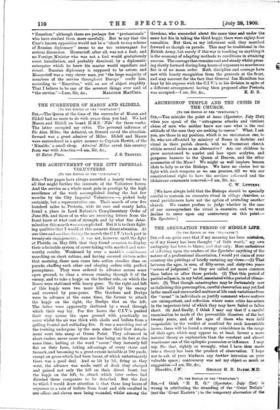THE ACHIEVEMENT OF THE CITY IMPERIAL VOLUNTEERS.
[To THE EDITOR OF THE "SPECTATOR."]
Sra,—Your pages have always accorded a hearty welcome to all that might further the interests of the Volunteer forces. And the service as a whole must gain in prestige by the high excellence of the work accomplished during the last few months by the City Imperial Volunteers,—a picked body certainly, but a representative one. Their march of over five hundred miles to Pretoria, wish its rare and scanty halts, found a place in Lord Roberts's Complimentary Order of June 8th, and those of us who are receiving letters from the front know at what cost of strength and by what fine deter- mination this march was accomplished. But it is to their fight- ing qualities that I would at this moment direct attention. At one time and another during the march the C.I.V.'s took part in twenty-six engagements ; it was not, however, until the fight at Florida on May 29th that they found occasion to display their admirable system of cover-taking with marked and note- worthy results. Weakened by over a month's continuous marching on short rations, and having covered sixteen miles that morning, these men came into action steadier than on parade, chaffing each other and obeying orders with perfect promptness. They were ordered to advance across some open ground, to clear a stream running through it of the enemy, and to take a kopje on the farther side, on which the Boers were stationed with heavy guns. To the right and left of this kopje were two more hills held by the enemy and crowned by pom-poms. The Gordons and Derbys were to advance at the same time, the former to attack the kopje on the right, the Derbys that on the left. The latter were apparently sheltered by a wood through which their way lay. For five hours the C.I.V.'s pushed their way across the open ground with practically no cover whilst the air was thick with shells and bullets from a galling frontal and enfilading fire. It was a searching test of the training undergone by the men since their first detach- ment went into camp at Green Point. They advanced in short rushes, never more than one line being on its feet at the same time ; halting at the word "cover," they instantly fell flat on their faces, taking advantage of every stone and tussock, and becoming to a great extent invisible at 700 yards, except on grass which had been burnt, of which unfortunately there was a good deal. And so bit by bit, firing as they went, the advance was made, until at dusk they charged and gained not only the hill on their direct front, but the kopje on the left, to attack which later orders had directed three companies to be detached_ But the fact to which I would draw attention is that these long hours of exposure to a rain of bullets from front and side resulted in one officer and eleven men being wounded, whilst among the
Gordons, who succeeded about the same time and under the same hot fire in taking the third kopje, there were eighty-four casualties. But then, as my informant said, they marched forward as though on parade. This may be traditional in the British Army, but surely if this war is teaching us anything it is the economy of adapting methods to conditions in attaining success. The courage that remains cool and steady whilst press- ing slowly forward during long hours of exposure to murderous fire is of no mean order. Both discipline and courage have met with hearty recognition from the generals at the front, and may account for the fact that General Ian Hamilton has kept by his express wish the C.I.V.'s in his division in spite of a different arrangement having been proposed after Pretoria
was occupied.—I am, Sir, &c., E. D. S.


































 Previous page
Previous page